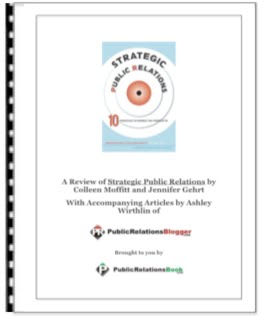________________________________________________________________________
 Because your customers care. Your competition probably care about it, too.
Because your customers care. Your competition probably care about it, too.
For companies of any size and most life-stages, public relations is something businesses should not ignore. (For reasons I say most life-stages, check out 4 Reasons Public Relations (Not Advertising) Builds a Brand.)
Public relations can do so much for a company, and yet, like social media, larger companies may see PR as an alternative to what they can already afford in advertising. (It is not an alternative to advertising.) PR is better than advertising. (Yes, I'm probably a bit biased.) It may take a bit more creativity and elbow grease, but the rewards and benefits of PR far outweigh advertising or marketing activities.
The tangible evidence of reduced costs is probably the one most used when trying to create advocates for PR, but there are more, intangible results that a PR team/firm can share with it's company/client. Those are:
I think you get the point. How does PR attain the above? By being the contact person of the company. By being aware of customers online. By being responsive to those customers online. And by being truthful, transparent, and engaging. With things like social media use, press releases, websites, blogs, etc., companies can be more connected with their buyers online, be more personable, and more personified.
As has been said time and time again, PR is more trustworthy than advertising. However, with the changes in technology, companies are more in control of their PR and are able to be more involved in the public relations process. In the past, companies were reliant on the media to cover them in a publication, and that was PR. This sort of PR was more credible than advertising because it was coming from another source.
The same is true today: advertising doesn't instill credibility or trust. In fact, it can often do the opposite. See the comments here about Toyota's attempts to rebuild its brand after their safety fiasco. What was a valiant effort to say "we're making a change" came across as a rather money-wasting endeavor. Had they simply shared with others, done interviews, and communicated with their customers online about this change in spending to increase safety, WOM (word of mouth) may have done more for them than a costly TV ad.
Even though Toyota (and BP) can afford advertisements, showing us the difference in ways other than a TV ad (like through PR) can be much more successful, and much more trustworthy. (BP's ads don't make me trust them more; it makes me wonder, "why tell me you're doing something, instead of simply doing it?")
As can be seen above, public relations today involves more things than simply getting mentioned in a publication. It involves social media, where a company can represent itself and be its own identity there. Companies can also have a blog, where they write about their company, their industry, etc., and try to set themselves apart from the crowd as a trusted source of information. This is also referred to as the process of positioning oneself as an authoritative figure. Over time, if you write on a subject, share information, or offer advice, people being to trust you and see you as a knowledgeable, go-to source.
Take this blog, for example. I often get emails asking for advice because of the success I've had in PR. I have little experience in PR, but my knowledge base is rather large due to the fact that I've been writing on the subject for so long. Surprised? Don't be. I don't pretend to be a PR expert with years and years of experience, but I do accept my role as a source of PR information.
So, as a company looking to increase followings, entice buyers to switch to your brand or become a loyal customer, or to simply share what you have to say, know that PR can be a great outlet because of the many, many places you can talk, communicate, and converse.
What's your take? Why care about PR if you can afford advertising?
Why Care About Public Relations?
________________________________________
 Because your customers care. Your competition probably care about it, too.
Because your customers care. Your competition probably care about it, too.For companies of any size and most life-stages, public relations is something businesses should not ignore. (For reasons I say most life-stages, check out 4 Reasons Public Relations (Not Advertising) Builds a Brand.)
Public relations can do so much for a company, and yet, like social media, larger companies may see PR as an alternative to what they can already afford in advertising. (It is not an alternative to advertising.) PR is better than advertising. (Yes, I'm probably a bit biased.) It may take a bit more creativity and elbow grease, but the rewards and benefits of PR far outweigh advertising or marketing activities.
The tangible evidence of reduced costs is probably the one most used when trying to create advocates for PR, but there are more, intangible results that a PR team/firm can share with it's company/client. Those are:
- Increased awareness. (For less money.)
- Increased trust. (For less money.)
- Increased loyalty. (For less money.)
I think you get the point. How does PR attain the above? By being the contact person of the company. By being aware of customers online. By being responsive to those customers online. And by being truthful, transparent, and engaging. With things like social media use, press releases, websites, blogs, etc., companies can be more connected with their buyers online, be more personable, and more personified.
As has been said time and time again, PR is more trustworthy than advertising. However, with the changes in technology, companies are more in control of their PR and are able to be more involved in the public relations process. In the past, companies were reliant on the media to cover them in a publication, and that was PR. This sort of PR was more credible than advertising because it was coming from another source.
The same is true today: advertising doesn't instill credibility or trust. In fact, it can often do the opposite. See the comments here about Toyota's attempts to rebuild its brand after their safety fiasco. What was a valiant effort to say "we're making a change" came across as a rather money-wasting endeavor. Had they simply shared with others, done interviews, and communicated with their customers online about this change in spending to increase safety, WOM (word of mouth) may have done more for them than a costly TV ad.
Even though Toyota (and BP) can afford advertisements, showing us the difference in ways other than a TV ad (like through PR) can be much more successful, and much more trustworthy. (BP's ads don't make me trust them more; it makes me wonder, "why tell me you're doing something, instead of simply doing it?")
As can be seen above, public relations today involves more things than simply getting mentioned in a publication. It involves social media, where a company can represent itself and be its own identity there. Companies can also have a blog, where they write about their company, their industry, etc., and try to set themselves apart from the crowd as a trusted source of information. This is also referred to as the process of positioning oneself as an authoritative figure. Over time, if you write on a subject, share information, or offer advice, people being to trust you and see you as a knowledgeable, go-to source.
Take this blog, for example. I often get emails asking for advice because of the success I've had in PR. I have little experience in PR, but my knowledge base is rather large due to the fact that I've been writing on the subject for so long. Surprised? Don't be. I don't pretend to be a PR expert with years and years of experience, but I do accept my role as a source of PR information.
So, as a company looking to increase followings, entice buyers to switch to your brand or become a loyal customer, or to simply share what you have to say, know that PR can be a great outlet because of the many, many places you can talk, communicate, and converse.
What's your take? Why care about PR if you can afford advertising?
Popular choices
- Non Gamstop Casino
- Mejores Salas De Póker
- Casino Non Aams
- Non Gamstop Casinos
- Siti Casino Online Non Aams
- Migliori Siti Casino Online
- UK Online Casinos Not On Gamstop
- Meilleur Casino En Ligne Live
- Non Gamstop Casino Sites UK
- Non Gamstop Casino Sites UK
- UK Casino Not On Gamstop
- Casinos Not On Gamstop
- Online Casino
- オンラインカジノ
- UK Casino Not On Gamstop
- UK Casino Not On Gamstop
- Reputable Non Gamstop Casinos
- Casinos Not On Gamstop
- Best Non Gamstop Casinos
- Non Gamstop Casino
- Casinos Not On Gamstop
- Slots Not On Gamstop
- Non Gamstop Casino
- Casino Non Aams
- Casinos Not On Gamstop
- Betting Sites Not On Gamstop
- Casino Online Italia
- Casino En Ligne
- Casino En Ligne Belgique
- Siti Scommesse Bitcoin
- KYC 인증 없는 카지노
- Sites De Paris Sportif Fiables
- Casino En Ligne France
- Casino Non Aams Prelievo Immediato
- Meilleur Casino En Ligne Belgique
- Meilleur Casino En Ligne 2026
- Meilleur Casino En Ligne
- Casino En Ligne 2026
- Casino En Ligne France
Subscribe to:
Post Comments (Atom)






Comments (0)
Post a Comment